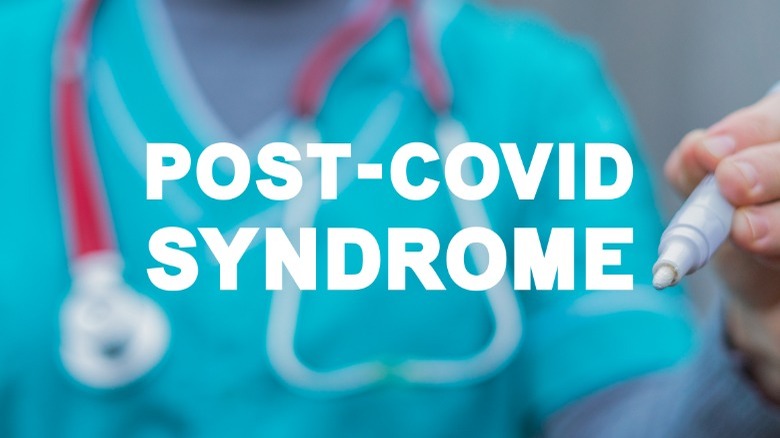Long COVID Might Not Affect You As Long As You Think
The number of total COVID-19 cases is fast approaching 102 million, according to the Centers for Disease Control and Prevention's (CDC) data tracker. However, weekly counts of new COVID cases have improved to some degree, running at roughly 332,000 after fluctuating in the 400,000s in the previous six weeks. Current hospitalizations are running a bit over 31,000, per CDC.
While many who have been infected with COVID have thankfully recovered, there are unfortunately people who are still feeling the effects of what has been dubbed "long COVID." The experts at Mayo Clinic describe long COVID, also known as "post-COVID-19 syndrome," as recurring or continuing symptoms related to COVID that linger for more than four weeks following recovery. The latest research suggests that 20% of people between the ages of 18 and 64 experience at least one medical condition related to COVID between a month and a year after infection. This statistic rises to about 25% for those 65 and older.
Examples of long COVID symptoms include fatigue, fever, respiratory issues, and worsening symptoms following mental or physical effort. Other long COVID symptoms one may experience include neurological symptoms or mental health challenges related to thinking or concentrating (brain fog), headache, sleep issues, dizziness caused by standing, pins-and-needles sensations, loss of smell or taste, and heart problems, among others, per Mayo Clinic.
Some celebrities have gone public about having lingering symptoms due to COVID, including actress Alyssa Milano, who reported experiencing hair loss following her infection (via Instagram), and actress and lifestyle guru Gwyneth Paltrow also reported being a "long-hauler," per InStyle.
What you should do if your COVID symptoms persist
While long COVID symptoms affect the quality of life for many, there's some good news. For those who have had a mild case of COVID, chances are good that you will not have to live with long COVID for, well, too long. According to a new study out of Israel, most people who experience milder COVID infections are less likely to have long COVID symptoms beyond a year, according to CNN.
The study — which followed 300,000 people over one year who had experienced mild COVID cases and compared their health to roughly 300,000 people who had not been infected — also indicated that those who have had mild COVID infections would experience fewer long COVID symptoms. However, Dr. Benjamin Abramoff, director of the Penn Medicine Post-COVID Assessment and Recovery Clinic, who was not associated with the study, told CNN that those who had severe COVID symptoms early in their infection or after recovery are at greater risk for experiencing long COVID symptoms for a year or more.
If you have COVID symptoms that last for more than four weeks, it may be worth getting a confirmed diagnosis since COVID symptoms can resemble symptoms of other health issues or underlying conditions triggered by COVID, according to the experts at UCLA Health.
To determine if symptoms are indeed long COVID-related, experts advise people to see primary care doctors first since they are most familiar with their patient's health history and can then direct them to an appropriate specialist if needed, per WebMD.


